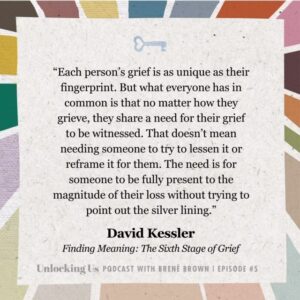
I often hear the phrases “grief is different for everyone”, “grief is not something you get over” and my personal favorite “there is no time frame for grief”. Yet, the same people that say these things really do just want you to move on and get over the grieving already. When you are not in the season of grieving the death of someone close to you, it is difficult to understand or even be around someone who is sad. I get it. I really, really do. Yet, if you are going to be an active participant in someone’s life and grief just happens to be a part of their season, then freaking show up for them!
When you ask how they are doing – make sure that when they say “I’m sad”, “I feel broken”, “my heart hurts today”, make sure you are ready to sit back and listen. And for those of you sitting in the back row seats, here it is again: STOP GIVING ADVICE!!!!! I don’t want your advice. I don’t want you to tell me that maybe I’m sad because I feel like I should be. What? I don’t want you to try and explain it to me or offer an empty gesture about the future state of my grief. STOP IT! Just please stop it. I know it’s awkward for you to sit in silence, to not be a helper, but guess what? It’s not about you.
I read something recently that summed this up nicely for me:
“The world is impatient with grief — married to the narrative of “getting over it,” enamored with the idea that grief can be sliced up into five stages that always ends with acceptance and “moving on.”
So I guess once you are through those five stages you are good to go then, huh? What if a person doesn’t go through all five stages? Then what? What if they skip around in the five stages? This is not conventional grieving. Gasp. Now what do you do as a helper?
Let’s go back to that statement, “grief is different for everyone.” Let’s sit on this for a hot minute. So if grief is different for everyone then that means some people may go through the five stages and others might not. It also means that some people sink so low into their grief they become depressed and sometimes suicidally so. It also means that some people are able to focus on the deceased person’s life more than death and find joy easier than others.
Here is what it doesn’t mean – you just stop grieving. I believe (at least in my own experience) that I will always grieve the lost life of Nikolai. I will grieve the person he could have been, the family he might have created, and I will mourn forever that he is not a physical part of our life. However, I also believe that life is more full of joy than grief. Life does move on and those of us grieving will find a way to move through the grief to also experience the joys of life. It does not mean that I won’t suddenly have a moment or day or week of utter sadness. It’s okay that I do. And, luckily I have a husband and an intimate group of friends who allow me that sadness yet also won’t let me unpack in that space.
It’s really quite simple: we love deeply, therefore we grieve deeply. There is no right or wrong way to grieve. You do you and turn a deaf ear to the ignorant who simply cannot sit in the awkward silence with you. It’s hard to do and even though I’ve had a year to practice, it’s still hard to tune it out sometimes. Just remember… other people’s opinions or thoughts about how you feel are none of your business.
